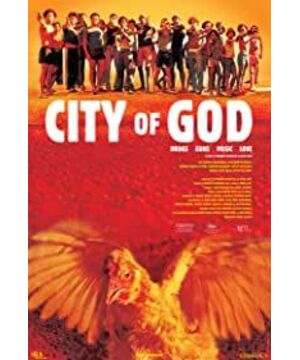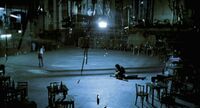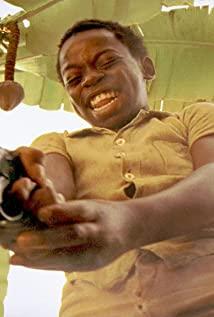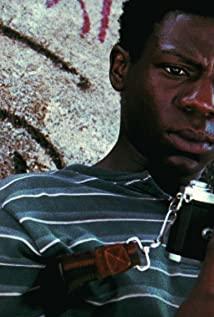"City of God": Prose-style beautiful segmented Ukiyo-e Text / Vulcan
The presence or absence of God may not be so important anymore. Many times, people can only rely on themselves to survive. Legend has it that there is a god who believes in the city, who is stroking the camera and combing his long hair every day. Dear. Have you ever seen those distant sorrows that happened in front of you? - Vulcan Ji. inscription .
The almost tragic stories are told in an extremely peaceful tone and a voice that borders on indifference. In my opinion, this is already a senseless blasphemy in itself. Perhaps, because of peace and indifference. And sad. Such a contrast can force a more tragic emotion more truly. This movie gave me that feeling to some extent. Because of tragic and solemn; so peaceful so indifferent. Because of peace and indifference; it exacerbates this tragic taste. The voice is slow, empty and sad. The film amazes me like a beautiful essay, referring of course to the narrative structure of the film itself. Dispersed and gathered. Seemingly scattered patterns, several stories are told from a sideline third-person perspective. Several protagonists take turns, connecting all the stories in a subtle, obvious, yet hidden way. Therefore, under the scattered structure, there is a more detailed and delicate calculation than the tiling. The script of the movie is very sophisticated and unconventional. The way the story is told has come very close to art. This is where the movie shines the brightest. I want to try to describe the film in a cinematic way, or finish this article in a cinematic way. Scattering, it should be; God gathering, I think it is difficult. But at least this movie gave me that kind of inspiration. Even if this is a brutal yakuza movie, extremely dark Ukiyo-e. However I like this movie. Not because of violence and darkness, but simply because of the fascination and endless worship of this narrative style. It can be said that this is a very good movie.
We come to the city of God to find heaven, many homes destroyed by floods, arson common in slums, homeless? Go to the city of God. But what is here. No electricity, no cement roads, no buses. The powerful live in another world, where there is hope, but that world is too small to accommodate so many people. Therefore, all people, go to the City of God to find despair and feel sadness together. This is a world that has been forgotten by Rio de Janeiro. A city abandoned by God has only sorrow. The city of God, a city that is closest to God and that God has no time to take care of.
1. THE END OF THE BEGINING
This subtitle was added by myself. There is no such subtitle in the movie. If I didn't see the end of the movie, I probably wouldn't have written such a subtitle when I started writing the movie. This film uses a lot of similar techniques. The beginning is the end. A large number of coherent and repetitive shots are widely cut and scattered throughout the film. Because it is scattered, it does not appear cumbersome and protracted; and the repeated shots are again superimposed in a certain corner of the film, which strengthens the dramatic tension of the climax. This shot technique adds a couple of seemingly cinematic climaxes to the film. In other words, this technique of the creators strengthens the effect of a certain scene and plot in the whole movie, but just this enhanced effect seems to me to be the climax of the movie. It can be said that, in a certain way, this movie gave me a shock of ups and downs and repeated ups and downs. The old movie, after the collection, this is a movie suitable for many people to watch together and also suitable for watching alone. When a few people watch it together, what they see is the smooth editing and the most incisively pleasurable shots of the film; while watching it alone, perhaps more often, you can watch the film's camera techniques quietly. I love this film: the shots, the story, the structure, the characters, the atmosphere and the music.
THE END OF THE BEGINING. In the set of sequences I have defined, maybe I should have foreseen all the results from the very beginning of the film. It has been fascinated by me since the beginning of the movie.
Flickering clips and abrupt camera movements. Taking the gun as the center, the camera made two full turns from left to right, then from right to left, 180 degrees back and forth. The first circle is the panic that has not yet entered the world; the second circle is the overall category. This left and right turn made me obsessed with this movie. In the previous chase from the perspective of the running crowd, the shaking hand-held camera close-up the fleeing chicken, the cheerful folk music and the arrogant and even ignorant laughter of the crowd. This movie has a strong ethnic atmosphere that makes people want to stop. THE END OF THE BEGINING. Never started but ended; or never ended but always started. The film has a strong sense of destiny. And in this manic madness, there is a kind of peaceful philosophy that never stops.
2. THE STORY OF HEROIC TRIO
The storyteller is called A Pao. But he is not the main character. The people being told are still not the protagonists. All the stories revolve around this slum called the City of God. Perhaps, the ultimate answer the whole movie is trying to find is how the people of God's city should find God's will and live according to God's will. This is a film about the city: a film about the dark childhood in the city; the young, absurd youth; the corrupt city; the most brutal gang, violence and gunfire. All the history of the city seems to be revealed only in the history of the changing gangs. Telling this city begins the first story. There is an inevitable connection between stories and stories, but they are independent of each other. Everything about this movie is just to find out the real philosophy behind these stories. Or, no philosophy. Only tyrannical mania and maddening desires. God hides from a distance and watches this rotten world. Don't say a word. No one could ever know that he was thinking of a larger proposition.
The first subtitle was made up by myself. This subtitle is my own guess. I don't say, maybe no one knows. Because of that tone and front-to-back view, no one can see what this subtitle is writing. This story is actually pretty stupid. Even if it looks beautiful. Maybe times are different, so the definition of so-called hero and so-called scenery is not the same. Three teenagers in the 1960s. Do nothing, chirping and dog thieves. Tell us from the perspective of a child that the story of the Three Young Heroes is famous in the City of God. In fact, it's just childish words. This childish heroic story is just a foreshadowing for the story of the little bully that follows. The film is based on the growth of a character and a growing vision as the perspective of the whole film. Therefore, in the 1960s, Ah Pao, who looked extremely beautiful and famous, was actually just a child's blind worship complex for his brother.
The Three Young Heroes thought they were "brothers". In fact, they are still far away from the real gangster. At best, it's just a juvenile, petty criminal gang. The brothers who are robbers and thieves but have never done a real big case are just a few degenerate youths who have nothing to do. The real gangster story may have to be told from the back story. It's just that A Pao here is just a little boy in his early ten years. Such childish words are one of the most human aspects of this movie. After all, it is not blindly deep. In this story, all the characters began to appear in turns. This is a bustling movie. An important question that I always think about a lot of the time is how can so many characters be portrayed so vividly in just 130 minutes. In the end, the three young heroes all made a tragic curtain call in the eyes of Ah Pao. Ah Mao, who died tragically under the gun of the police, Ah Dai, who was shot to death by Xiaodouzi, and Ah Jia, who converted to God's embrace. In that era, in addition to madness, a quiet life may only be out of the world's attention. There is no good end. All died tragically, except for Ajia, who suddenly converted to an epiphany. A Mao's love seems so fragile and vulnerable, A Mao's death seems a bit pitiful, but no one will sympathize with him no matter what, even if I love this character so much. Dude, brother didn't stop, just paused. So he also died. I quite like these three characters because they have nothing but everything that fate has brought them. Born in a slum, there is no future, no hope, no money, no way out. Their death revealed a kind of fateful sadness. I like them, but there is no way to pity them. Not because of my cruelty; but because the movie, in its peaceful tone, seems to have been doomed. And because it is destined, there is no need for mercy. This statement made me suddenly a little disgusted with myself, but this movie has such power to make me despair.
Perhaps the words of the staff of the Hour Hotel who were tied up before they died already fully stated the sad fate of these three people: you should go to school or go to work, you are only children, or even Not like a robber... Indeed, no jobs, no books to read, no money. But they didn't have the brains to think about how to get fame and money, so they couldn't get rid of the fate of the slums. Besides roosters, what other more meaningful things can they do? Life in the 1960s, perhaps, with the bravery and the occasional fluke, could bring them something. And at a certain age, young people always thought that crazy behavior was all there was to life, so they lived and died in the '60s while they seemed to shine and sadly. Those were three lovely teenagers, three poor teenagers. Watching their fallen bodies elicited no emotion from anyone. Because the whole slum life itself is already hopeless. The era of the Three Young Heroes was a fateful tragedy. It is also a social tragedy. No one will condemn them. And no one will sympathize with them. What do people have other than indifference. After all, the whole society is full of this kind of despair. No personal emotion can be used or saved.
The world of young A Pao is already full of sadness. I don't know what the city of God will look like in the eyes of adults. But at least, from the indifferent eyes of those people, I see more of the sorrow that has been numb and unable to perceive. God is watching from a distance. God, like his brothers, will not stop, but will only pause. Taking a break is just to better manipulate the world. The City of God is a desperate city.
3. THE STORY OF THE APARTMENT
This is the most concise story of the movie. Positioning the angled paragraph shot, from the deepest part of the apartment towards the door of the apartment, the main part of the paragraph shot is the hallway and the living room in the middle of this apartment. This is probably the one I'm most addicted to of all the camera language. Fixed position and angle, fixed viewing angle. All things happen in the camera: happen, change, die, end, continue, rebirth. This is also a very indifferent lens language. It's like sitting in front of a mirror, looking absolutely objectively at what's going on outside the window, watching without moving, no matter how touching what's happening in front of the window. Extreme indifference, because of the power. This is probably the longest shot in the movie, not a long shot, but the longest shot in the time span. Straight from the 60s into the late 70s. Everything. Most of the shots in this segment are multi-frame shots, which are more than double the usual 24 frames/S. So what we can see is a completely impetuous world. Rapidly: happening, changing, dying, ending, continuing, reborn. This sequence of shots is also the most ukiyo-e-like place in the film, where everything happens so fast.
Perhaps it can be said that this apartment has changed hands several times, and it has been a few ups and downs in the most corrupt and gloomy world in the entire City of God. Therefore, the sequence shots more often mean a microcosm of the development model of the city of God from the original individual operation to the later group-operated drug market. In this sense, this sequence of shots has been given too much by the director. From the drugs run by a rotten middle-aged widow, to a small gang of several people, to a group-style operation. What happened in this little apartment is just a microcosm of all the thousands of apartments in the entire City of God. Perhaps what we can see from this paragraph is a microcosm of the rapid underworld and rapid degeneration of the entire City of God in the 1970s. In this segment shot, the frame rate determines all the emotional expression. The multiple 24 frames/S lens is the epitome of an era, and the slow-moving lens of nearly 1 frame/1S to 2S depicts the major changes in this era. The plot is tight and powerful or loose and crisp, and what's more interesting is that fast shots are used to express relaxation, while slow shots show compactness instead.
This sequence of shots more shows the director's familiar and super powerful ability to control the shots. The operation of the positioning shot is almost mature in this film. In my opinion, it is already a classic for positioning lenses. The lens expresses far more than a lens can express. Watching the people in this shot keep changing and all the objects in the apartment keep being moved, what we can imagine is that perhaps a fallen age has begun to rapidly continue to fall in a more forceful way. See the big from the small, and see the whole leopard at a glance. Rarely has a shot so powerful and crisp can be so powerful and inclusive.
The story of this apartment only seems to stop after Bully's frantic sweep. But when we think back to this sequence of shots, maybe we can also understand another layer of meanings contained in this shot. Like the big guy, the red hair, the black guy...etc, they just flashed by in this shot and it was over right away. But who of them doesn't have a history like the little bully? So the story covered by this scene shot is far more than just this shot. The story of this apartment did not stop with Hei Zai, but continued with Xiao Bawang. Behind the little bully. If this shot has always been positioned here like this, maybe, the little bully would have passed by in just a few seconds. The story in the camera didn't stop. The stories in the apartment never stop. The story in the apartment may pause, but it will never stop. This sequence of shots has the greatest tension and tolerance in the language of the shots. Appreciate it.
2007-01-31; Bingxu year Xin Chou month Yi Chou day.
Who once lived in what kind of era; what kind of choices and what kind of life did they face. For them, there is no choice at all. - Vulcan Ji. Inscription.
4. THE STORY OF LI'L ZÉ
All stories are actually related to this story. In other words, all the stories are actually inextricably linked, and survive in a kind of continuity. A little boy named Xiaodouzi, an ugly black man from the slum who later changed his name to Xiaobawang. Throughout the seventies and eighties, he dominated almost the entire City of God. impulse. Manic. tyrannical. brutal. spiteful. envy. Sick. Rogue. rogue. drug dealer. Gangster boss. Almost all of these, whether character traits or identity, have been seen in this person.
In the 1960s of the Three Young Heroes, in their story, Xiaodouzi was just a small sidekick. However, it was he who gave the young three heroes the idea of a crime. And because he was obsessed with the desire to kill, he finally caught up with the three young heroes. Ah Mao was shot to death by the police, and died with his failed love dream and his desire to be good; Ah Dai died innocently with his ignorance and unknown under the gun of a ten-year-old Xiaodouzi; the only redeemed Ah Jia converted to God Maybe it's already the best way out. The last episode of the story of the three young heroes is Xiaodouzi's robbery plan for the Hourly Hotel. The plan ended up being the craziest and bloodiest case of violence in the City of God. And yet this violent story ends: they didn't kill a single person. And the most insane and bloody violent cases are just the first starting point on Xiaodouzi's road to overlord. At this time, he was still called Xiaodouzi, a ten-year-old child. However, his innocent, cheerful and even a bit tyrannical smile can only be seen when he is shooting like crazy. It can be said that he ended the story of the three young heroes and their era ahead of time and brought the city of God into another era, the era of completely brutal gangsters.
The story of the apartment also paused temporarily for him. In a way, the movie is less about the city of God than a biographical film about Bully himself. Because in the end all stories seem to be tied to the character of the little bully. The apartment is the epitome of the City of God in the 70s, and Beanie and Benny in the 70s got along pretty well, and as Poo narrates, they have enough criminal talent. The final apartment belongs to the era of the bully, which means that the city of God is basically formed by the situation where the bully dominates the world. A bygone era is gone forever. The story of the apartment is actually still a footnote in the whole story of the bully.
It can be said that this story is the most important part of the whole film. All the other stories just revolve around this story, or rather, the other stories just enrich all the plots of this story. Xiaobawang is like a nouveau riche. Also do evil and evil. But I like this character. At least, when watching the movie, he once gave me a kind of arrogance that I had longed for during the manic period, but when all my arrogance only existed in imagination, this character completed it for me. No one will hate this character, because this character himself completes our life for us. The things we wanted to do, the destructive urges we had repressed, this character did for us, at least on screen. I once fantasized that I would be a bad person, a villain who would do whatever he wanted to destroy, but I didn't have that kind of courage, so the appearance of this character at least satisfies my desire from perspective.
Rarely has anyone portrayed a villain so thoroughly. And the best thing about this movie is that there are many villains in this movie, but none of them are annoying. Because of fate. It may not be their own choice to be evil. But it is just the last resort fate in a certain city in a certain era. Therefore, they can only do evil. Behind this evil is the greatest sympathy and compassion for that era and those people. Who once lived in what kind of era; what kind of choices and what kind of life did they face. For them, there is no choice at all. People in impetuous times have to face their own lives. There is no way to escape.
The bully is indeed hopelessly evil. With a little bit of criminal talent and evil nature, when I was a child, I watched with my own eyes in those seemingly enjoyable shots, he laughed and shot all the enemies and those innocent people, right. For me, it is the satisfaction of desire from the perspective, but for the child who is only more than ten years old, what is that? No reason is required. There is no reason. everything. Just for killing. The domination of the little bully and the final fall is because the times are moving forward. What the City of God was like in the 80s. Misbehaviour always ends when he rapes Ned Handsome's girlfriend, smashes his home, and kills his brother and uncle. Maybe as A Pao said, this is a showdown between the ugly bad guy and the handsome good guy. And the real showdown may be the showdown of the entire City of God gang forces. Brothers will not stop, only pause. And who can fathom the mind of God? From the initial revenge action to the last frantic firefight, no one remembers why the fire was fired in the first place, just to grab more territory, sell more drugs, buy more guns, and kill more people. Rights and desires ultimately rule everything. Any reason and excuse have become the surface of the killing, in the final analysis, it is still desire. Although the little bully is evil, he looks innocent and shy. At least he is a little shy when he is courting the handsome Ned's woman. When he sees his photo on the front page, he will happily say , people finally know who is the boss, and then buy a lot of newspapers to distribute to pedestrians on the side of the road.
Sinful; yet lovely. Not hateful; and pathetic. All people are ultimately miserable creatures consumed by desire. In other words, this so-called city of God is actually a city without hope. So everything that happened in this small town was not enough to arouse any kind of emotion in people, because it was a matter of course. And of course, the greatest sorrow and sympathy. The so-called peace period when the little bully ruled was like a flash in the pan. Calm, just because of a frenzy for a while. This is their fate, and this is the fate of the city. The little bully finally died at the hands of a group of children as young as when he was a little bean, a group of children more brutal than him, when he himself was completely unaware of the danger. The fate of the City of God will not change, it will only be calm for a while and then continue. This is the most frustrating part of this movie. People can only choose to leave, or to survive, or to say viciously to everyone, starting today, I will be in charge.
5. FLIRTING WITH CRIME (intent to commit a crime)
The story finally came to the narrator's gun. It's a desire for good and an attempt at complicity. Ah Pao is a poor boy. At least the kindness and qualities of a good person in him. However, what can be seen more often in him is a powerless struggle. Intent to sin because of the predicament of being a good man in the city of God, being bullied, having no way forward, confusion, and perpetual worry. In him, we can see and feel the rare lightness in this movie. Thinking about how to get rid of a virgin, thinking about how to make money, thinking about how to become a photographer, thinking about how to get out of the city of God and out of the slums. Or thinking about how to be a villain. His attempts all ended in a playful failure. A good person can only be a good person after all.
From teenage guns to photographer Wilson Rowley. On the road of his growth, he could never get rid of the figure of the little bully. Xiaobawang killed his brother, Ah Dai, but he did not dare to take revenge because he was cowardly. His first front page photo was forced by Xiaobawang to make him a trainee reporter. His first high salary was a picture of the death of the little bully. What earned him notoriety was the photo of the little bully bribing the police. Everything about him is related to the little bully. Intent to commit a crime was the quickest way out of his current predicament. However, because the bus driver is also from the City of God, he can't rob; because the bakery clerk is pretty and flirts with him, so he can't draw a gun at her; because the Pakistani who asked for directions asked him to smoke marijuana, So he still did not succeed in the crime in the end. He has his way. In this film, his eloquent and objective recounts the change and development of all the criminal forces in the city of God from the 60s to the 80s. And in him, at least what we see is a flesh-and-blood child who is working hard. Intent to sin was his struggle, and the struggle between good and evil. And he, in this movie, may be the only hope and hope that indifferently gives us.
6.BENNY'S FAREWELL (Benny's Farewell Party)
Benny is the coolest gangster in the city of god. Also the best rogue in town. He buys beer, gives people marijuana, dresses brightly, and is very popular. He is Bully's best friend and best friend. If the bully is the embodiment of cruelty, then he is gentle. He and the bully are two extremes. And he is the film's emotional buffer and neutralization for the little bully. He is also the brightest representative of the dark forces in the entire City of God, and the most critical figure in the checks and balances of the dark forces in the entire City of God. He and Xiaobawang have committed crimes together since childhood and shared the country he and Xiaobawang fought together, and he and Hongmao are good friends, so the City of God still has at least a short-term calm under his control. . The city of God is divided in two, and he is the checkpoint.
Benny is too nice to be a hooligan. Farewell party, because he wants to say goodbye to Bully and his career, and find a farm to smoke marijuana and listen to rock music with his girlfriend. Light and shadow, broken frames, clips. The swaying at the farewell party was Benny's last orgy. No one wanted him to die, but he died. Innocently resisted a bullet for the bully. Maybe, he was the only friend of the little bully, so when he died, the little bully's frantic roar depicted the only warmth of the little bully. His death was the downfall of the checkpoint for the entire City of God. The start of the war and his death are closely linked. If he doesn't die, the bully won't go to Red Mao for revenge, he won't meet Handsome Ned's girlfriend, he won't have a bloody feud with Handsome Ned, and he won't end up going to war with Red Hair.
Benny's farewell party may also be the last carnival in the entire City of God. After this, the brief peace ended completely. A Pao said that the city of God has completely fallen into hell from purgatory on earth. Benny may not realize that he has such a pivotal role in the entire City of God. Farewell party, Benny, and the last patience of Xiaobawang, the good time when Hongmao and Xiaobawang coexist peacefully, and the last quiet and peaceful city of God. This story is one of the biggest turning points in the film. After that, everything fell.
7. THE STORY OF KNOCKOUT NED
Is Handsome Ned a hero? It's hard to define. A handsome man, a man who is honestly trying to get out of the city of God. He went to school, served as a soldier, practiced karate, and was the first marksman in the barracks. He hoped to leave the city of God and the slums and finally became a brother in despair.
What we see in him may be a more desperate struggle. He doesn't like violence, he doesn't like killing, he loves peace and love. He has also worked hard to maintain his own life. However, his efforts were still completely destroyed by the madness of the bully. He didn't want to be a brother, he didn't want to be a hooligan. Yet he wanted revenge. For his dead uncle and brother, for his warm home that was bombed, for his innocent girlfriend who was raped by the bully. His struggle lies in the whole process of his fall. He did not choose to join the red-haired organization. Because in the City of God, only Hongmao can take him in, and Hongmao is the only remaining force outside the little bully. And his fall was on full display in their three robberies. He said that he joined the red hair on the condition that those innocent people were not allowed to be killed. So the first time, his condition saved an innocent clerk; the second time, Red Mao killed a clerk who wanted to kill handsome Ned, Red Mao said, there are exceptions to any rule; the third time, handsome Ned Killed a rebellious staffer because exceptions became the rule.
His fall still has a strong fateful tone. He led the red-haired group to be able to compete with the little bully. In the end, however, he was still the innocent victim of desire. No one will remember his hatred, only desire, and more intense desire. Handsome Ned is one of the most desperate symbols in the movie.
8. THE BEGINING OF THE END
Handsome Ned is dead. The bully is dead. Red Hair was arrested. The ending of the movie is such a sad ending. This tragic ending was doomed early in the morning. Handsome Ned died under Otto's gun, but Otto's gun was taken from Handsome Ned and the others, and he avenged Handsome Ned for killing his father. The little bully died under the pistol he gave to those little devils. He didn't even have a chance to struggle or scream, and his whole body was filled with bullet holes. All endings finally come to the beginning. If Handsome Ned didn't give Otto a pistol, if Bully didn't give each of those brats a pistol... but, no if. The two largest gangster forces in the City of God ended up being completely wiped out at about the same time. God does not stop, only pauses. After they die, there will naturally be a group of people to replace them. The arrogant and domineering appearance of those little devils after killing the little bully has a bit of the air of Xiaodouzi back then.
The beginning of the end, the unfinished story behind the movie continues. Destiny, such a tragic destiny is constantly being staged in the city of God and the curtain call is taking turns. And the road ahead is still confusing.
2007-02-01; Bingxu year Xin Chou month Bing Yin day.
Note: Movie information. ■Title: "City of God" ■Title: "City of God" ■Director: Cadia Rand/Fernando Merrills ■Starring: Matheus Nachtergaele/Alexandre Rodrigues ■Genre: Thriller/Drama/Crime ■ Duration: 130 min Country: Brazil/France/United States Language: Portuguese Release: Asmik Ace Entertainment Release: May 18, 2002
View more about City of God reviews









